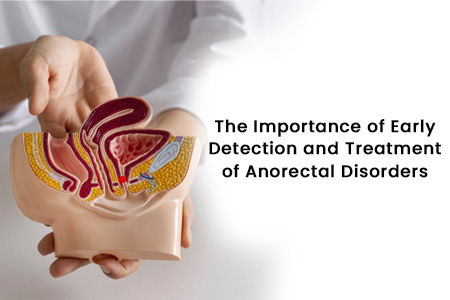Anorectal disorders encompass a range of conditions affecting the anus and rectum, such as hemorrhoids, anal fissures, fistulas, and rectal prolapse. Timely detection and treatment are crucial for managing these conditions effectively, preventing complications, and improving quality of life for patients. Here’s why early intervention matters:
1. Preventing Progression
Early detection allows for prompt initiation of treatment before conditions worsen. For example, hemorrhoids, when identified early, can often be managed with non-invasive measures like dietary changes, topical treatments, and lifestyle modifications. Delayed treatment may necessitate more invasive procedures or surgeries.
2. Minimizing Symptoms and Discomfort
Anorectal disorders can cause significant discomfort, pain, itching, and bleeding. Early treatment helps alleviate symptoms quickly, improving patient comfort and reducing the impact on daily activities. Prompt management also lowers the risk of complications such as infections and chronic pain.
3. Avoiding Complications
Untreated anorectal disorders can lead to complications such as thrombosis (blood clotting in hemorrhoids), anal abscesses, fistula formation (abnormal connections between organs), and anal stenosis (narrowing of the anal canal). Early intervention reduces the likelihood of these complications, which may require more invasive treatments or surgeries.
4. Enhancing Quality of Life
Effective management of anorectal disorders early on improves patients’ quality of life by minimizing symptoms and discomfort. It allows individuals to maintain normal activities, work productivity, and social interactions without the hindrance of ongoing pain or embarrassment.
5. Cost-Effectiveness
Early detection and treatment are generally more cost-effective compared to managing advanced stages of anorectal disorders. Non-surgical interventions and outpatient procedures are often sufficient in the early stages, reducing healthcare costs associated with hospitalizations and extensive treatments.
6. Psychological Well-Being
Anorectal disorders can have a psychological impact due to pain, discomfort, and concerns about hygiene and appearance. Early treatment not only addresses physical symptoms but also supports emotional well-being by relieving anxiety and improving self-confidence.
7. Tailored Treatment Options
Early diagnosis allows healthcare providers to offer a range of treatment options tailored to the severity and specific needs of each patient. This may include lifestyle modifications, topical medications, minimally invasive procedures, or surgical interventions when necessary, ensuring personalized care.
8. Screening and Prevention
Regular screenings and early detection programs can identify anorectal disorders in their asymptomatic or early stages, especially for high-risk individuals (e.g., those with a family history or predisposing factors). Screening enables timely interventions and preventive measures, promoting long-term health and reducing disease burden.
Conclusion
Early detection and treatment of anorectal disorders are crucial for maintaining health, preventing complications, and enhancing overall well-being. At Dr. Saraja’s Ayurvedic Anorectal Centre, the Best Kshar Sutra treatment in Hyderabad we prioritize proactive care through heightened awareness, regular screenings, and timely consultations. By advocating early intervention, we empower individuals to manage conditions effectively, promoting optimal health outcomes and fostering a vibrant, active lifestyle.
Our holistic approach ensures comprehensive support for patients, emphasizing personalized treatments that integrate Ayurvedic wisdom with modern medical expertise. For those affected by anorectal disorders, choosing early treatment with our Best Ayurveda Doctors in Hyderabad means prioritizing long-term health and wellness.

